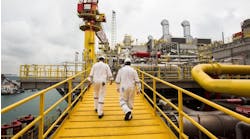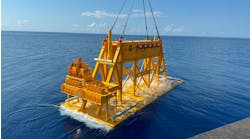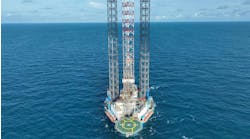Franco-Indian run-around
The Indians seem to be getting the run-around from the French lately. Recently, French major TotalFina told India's Oil and Natural Gas Corp (ONGC) that it was keen to take part in the Bombay High Field offshore India. At the same time, TotalFina subsidiary, Elf, all but scoffed at Indian Oil Corp's (IOC) interest in taking a stake in the company's Balal Field development off Iran.
Total expressed interest in providing technical assistance and other services to ONGC to help increase reservoir production (currently 12 MMcf/d of gas) from the Bombay High Field. ONGC had announced plans to invest $1.5 billion to boost the recovery rate from 26-28% to 40%.
In addition, the company said it also was interested in exploring the country's deepwater blocks and helping develop the Krishna Godavari basin in the Bay of Bengal. Krishna Godavari was the first deepwater find in the country and yielded 3,600 b/d of oil.
J. C. Berton, TotalFina's Chief Representative in India was quoted as saying, TotalFina wants to be a significant player in India and funds are not a constraint. "We want to go for exploratory blocks in India that are larger and have bigger yields."
The company added that they have informed ONGC of their interest to participate in the wells, but ONGC has yet to respond. While TotalFina wants in now, it did not bid on the 27 blocks recently on offer under the New Exploration Licensing Policy, a licensing round that was looked at as somewhat of a disappointment.
On the other side of things, TotalFina's latest acquisition, Elf, gave what was reported to be a very low-key response to the IOC (the other state-owned company) plans to invest in the Balal project. Elf said that IOC had contacted them, but added that companies are often interested in taking a stake in their projects.
Previously, Elf gave a strong reaction to IOCs interest saying that it was "completely wrong." IOC is interested in taking a 35% interest in the project and investing $59.15 million.
Department store tycoon has two finds off Thailand
Mohamed Al Fayed has another job waiting for him if he ever tires of selling retail products. Al Fayed, the owner of the world famous Harrods department store in London, diversified his holdings in 1998 by establishing his own oil and gas company, called Harrods Energy. The firm picked up offshore blocks from Thailand state oil company PTT Exploration and Production. Since that time, Harrods has already notched two discoveries.
Harrods Energy announced its second oil discovery in Block B5/27 offshore Thailand in recent months. Four wells on the block have a yielded a total flow of 8,000 b/d of oil. The company now is weighing the commercial viability of the discovery and planning additional delineation wells. The first well, drilled in June, encountered multiple zones and tested at a combined rate of 1,096 b/d of oil. The three most recent wells were tested from multiple zones and showed combined rates of about 1,000-3,000 b/d for a total of 8,000 b/d of oil.
Harrods holds a 50% interest in the block with partner PTTEPI, a subsidiary of PTT Exploration and Production, holding the remaining 50%. However, Harrods will soon increase its stake to 12.5% when PTTEPI transfers the share under the contract on the block.
Harrods holds interests in four additional blocks offshore Thailand: B2/38, B11/32, B11/38, and B12/32.
WAPET: Shell out, Chevron in
The proposal by Chevron's subsidiary, Chevron Australia, to assume operatorship of West Australian Petroleum Pty Limited (WAPET) has been accepted by the other members of the joint venture - Mobil, Shell, and Texaco. The company will operate the group's holdings, which include Australia's first major oil field in the Barrow Island area, the Thevenard Island oil fields, and the Greater Gorgon gas fields in the Carnarvon Basin.
The company has maintained the status as advisor and provided management and technical support for the group for over 35 years. The company said that next step is to establish a managed transfer of responsibilities from WAPET to Chevron to ensure a smooth transition. Chevron will formerly take over as operator during the first quarter of this year. WAPET was formed in 1952 under a 50-50 joint venture between Chevron and Texaco and produces 12,000 b/d at Barrow Island and 18,000 b/d at Thevenard Island. Chevron has interests in over one-fifth of Western Australia's oil and gas reserves and is the largest gas holder in the region.
However, Shell, has put its WAPET assets up for sale. The company is selling a 28.57% interest in Barrow Island, a 35.71% interest in Thevenard Island, and interests in the four exploration permits. Analysts have estimated that the assets could fetch $150-200 million.
Esso staying put in Malaysia
Despite a new Islamic government taking power in the eastern Malaysian state of Terengganu, Esso Production Malaysia has said that its plans remain unchanged.
Late last year, the Islamic fundamentalist Parti Islam se-Malaysia won control of Terengganu from Prime Minister Mahatir Mohamed's Barisan Nasional coalition in an election.
The chairman of the company, Philip Dingle, was quoted as saying that the change in government has not affected plans. "We're here for developing oil offshore, so it doesn't affect us. We are only interested in the geology and prospecting in the area and our view and operations have not changed under the Petroleum Development Act of Malaysia. So, a change of state government should not affect the laws and regulations of Malaysia."
However, the Parti Islam se-Malaysia has said that it plans to make some changes. The Chief Minister said that the government now wants higher oil royalties to help alleviate poverty.
The current royalty regime, created under 1974 federal legislation, stipulates annual royalties to the state of five percent of all offshore oil and gas pumped by state owned Petronas. This averages out to about $130 million per year for the state, which produces about 60% of Malaysia's oil. But the new government wants more. Chief Minister Abdul Hadi said some time back it wanted royalties to be raised to 20%, but now has said that it is up to the federal government to make a review of the royalties. He added that his government has initiated talks on the subject.


